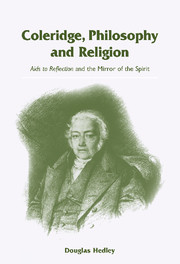Book contents
- Frontmatter
- Contents
- Acknowledgements
- List of abbreviations
- Notes on the text
- Prologue: explaining Coleridge's explanation
- 1 The true philosopher is the lover of God
- 2 Inner word: reflection as meditation
- 3 The image of God: reflection as imitating the divine spirit
- 4 God is truth: the faculty of reflection or human Understanding in relation to the divine Reason
- 5 The great instauration: reflection as the renewal of the soul
- 6 The vision of God: reflection culture, and the seed of a deiform nature
- Epilogue: the candle of the Lord and Coleridge's legacy
- Bibliography
- Index
2 - Inner word: reflection as meditation
Published online by Cambridge University Press: 15 December 2009
- Frontmatter
- Contents
- Acknowledgements
- List of abbreviations
- Notes on the text
- Prologue: explaining Coleridge's explanation
- 1 The true philosopher is the lover of God
- 2 Inner word: reflection as meditation
- 3 The image of God: reflection as imitating the divine spirit
- 4 God is truth: the faculty of reflection or human Understanding in relation to the divine Reason
- 5 The great instauration: reflection as the renewal of the soul
- 6 The vision of God: reflection culture, and the seed of a deiform nature
- Epilogue: the candle of the Lord and Coleridge's legacy
- Bibliography
- Index
Summary
Our hearts find no peace until they rest in you.
(Augustine, Confessions 1.1)In the beginning was the Word, and the Word was with God, and the Word was God.
(John 1:1)Exclusive of the abstract sciences, the largest and worthiest portion of knowledge consists of aphorisms: and the greatest and the best of men is but an aphorism.
(Aids, p. 34)Aids to Reflection is permeated by the literary tendencies of an age which encouraged a conversational tone on the part of the author. In the ‘Age of Sensibility’ friendship was a particularly common literary motif. Biographical confessions of a seemingly private nature were, prior to Romanticism, both rare and thought undesirable: Rousseau's Confessions (1782) and Gibbon's Memoirs of my Life (1796) were published posthumously. However their publication constitutes instances of a developing European trend towards autobiography culminating in Goethe's Dichtung und Wahrheit (1811–33). Coleridge's Biographia Literaria (1817) was published long before Wordsworth's Prelude (1850) and Newman's Apologia Pro Vita Sua (1864). Thomas de Quincy's Confessions of an Opium Eater (1822) is a good instance of the novel and rather scandalous resonance of autobiographical confessions in this period.
The eighteenth century was a period in which letters or aphorisms assumed a particular importance in the wake of the salon culture, and in which biographical elements, travel news, and intellectual gossip were often integrated into a book form. An obvious example is Friedrich Heinrich Jacobi's Concerning the Teaching of Spinoza in Letters to Mr Mendelssohn (Ueber die Lehre des Spinoza, in Briefen an den Herrn Mendelssohn) in which Jacobi reports on his visit to Lessing and his conversation with him.
- Type
- Chapter
- Information
- Coleridge, Philosophy and ReligionAids to Reflection and the Mirror of the Spirit, pp. 88 - 152Publisher: Cambridge University PressPrint publication year: 2000



